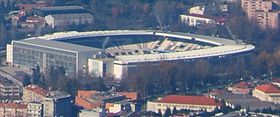|
Estádio D. Afonso Henriques
The Estádio D. Afonso Henriques (English: D. Afonso Henriques Stadium) is a football stadium in the city of Guimarães, Portugal. The stadium is home of Guimarães's most successful team, Vitória de Guimarães, presently competing in the top-flight Portuguese Liga. The stadium was built in 1965 and was renovated and expanded in 2003 for the UEFA Euro 2004 tournament by architect Eduardo Guimarães for €37.3 million.[1] Estádio D. Afonso Henriques has a capacity of 30,029 and it is named after the first King of Portugal—and also a Guimarães native—Dom Afonso Henriques.[2] It was formerly known as Estádio Municipal de Guimarães. HistoryAfter Campo da Atouguia, José Minotes, Perdiz, Benlhevai and Campo da Amorosa, Vitória had a new home. In 1962, a new competition was launched to create a new bench in the venue. Shortly after, around 2 years, the Portuguese Football Federation awarded 200 contos for laying grass in the stadium.[3] Because the Federation required all first division clubs to play on a grass field, the Guimarães Municipal Stadium was inaugurated on it was then on January 3, 1965 prior to completion.[4] Located in the city center, it was Vitória SC's first stadium and built to replace the demolished "Campo da Amorosa" which was the club's home for around 20 years. With a capacity of 15,000 seats, the project cost around 8,500 contos. The inaugural game of the new stadium pitted Vitória SC against Os Belenenses for the Portuguese I Division, in which the Vitoria team won (2-1). In the 9th minute of the game, Vimaranense Albertino Castro, a player trained at the club's schools, scored the first goal on the new field.[5] Inácio, in the final stretch of the match, scored the winning goal for the Victorians.[4] Until then, the stadium was owned by the Guimarães City Council, and on December 27, 1989, the Municipal Assembly voted in favor of the transfer of the Guimarães Municipal Stadium to Vitória Sport Clube.[6] The venue was one of the stadiums chosen to host tournament games for the 1991 U20 World Football Championship in Portugal and the stadium underwent its first major renovation.[7] On 30 September 1995, a proposed methodology for choosing the new name of the Stadium was approved at the General Assembly. The members voted between two proposals, "Afonso Henriques" and "Vitória Sport Clube". In the first phase of the process, the names of Estádio da Amorosa and José Maria Castro Rodrigues were also proposed, which were later discarded. The proposal for D. Afonso Henriques in honor of D. Afonso I, first King and founder of Portugal, won with 453 votes, against 358.[8]  In order to host games for Euro 2004, the D. Afonso Henriques Stadium underwent extensive renovation works between 2002 and 2003. The stands and other areas serving the public were remodeled to accommodate 30,000 spectators.[9] The stadium was designed by local architect, Eduardo Guimarães, who enclosed the stadium with a new south stand that from the street resembled that of a building, giving homogeneity between the streets and the stadium with a green surrounding with living spaces and leisure and good accessibility.[10] The inauguration of the new stadium took place on July 25, 2003, with the inaugural ceremony, at which time the Guimarães City Council handed over the work to Vitória Sport Clube, still under the presidency of Pimenta Machado, now with the new name D. Afonso Henriques Stadium. A crowd of 29,865 watched a multimedia show, followed by the game between Vitória SC and 1. FC Kaiserslautern, which the Guimarães won 4-1. Afonso Martins (who debuted the new venue), Nuno Assis, Rubens Júnior and Guga scored.[11] Musical EventsThe biggest musical event that this stage hosted was the 1st edition of the North Music Festival on 2 and 3 June 2017.[12] This Portuguese Urban Festival is mostly made up of Portuguese artists, including Salvador Sobral, who won the Eurovision Song Contest 2017. The event had a total audience of around 16,000 people.[13] Sports Events The Estádio D. Afonso Henriques hosted two games at UEFA Euro 2004. The opening fixture of Group C was between Denmark and Italy, in which the match ended 0–0. The last fixture of Group C was also played at the stadium, this time between Bulgaria and Italy, in which it ended 2–1 to Italy with goals from Martin Petrov for Bulgaria and goals from Simone Perrotta and Antonio Cassano for Italy. Although Cassano's 94th-minute strike won the game for Italy 2–1, in the other game between Denmark and Sweden, it ended 2–2 with a 89th-minute strike from Mattias Jonson. Jonson's goal resulted in Italy's exit out of the tournament on goals scored in third place, behind Sweden in second place and Denmark in first place. Also during the 2006 UEFA European Under-21 Football Championship, the stadium hosted two of the tournament's matches. In 2018, it hosted the match between Portugal x Poland, referring to the last game of Group 3 of League A of the first edition of the 2018–19 UEFA Nations League. The following year it served as the stage for two games in the Final Stage of the same competition. Portugal National TeamThe following national team matches were held in the stadium.
Portugal Women's National Team
1991 FIFA World Youth (Under-20) Championship
UEFA Euro 2004
2006 UEFA European Under-21 Championship
UEFA Nations League 2019 Finals
Miklós Fehér's deathThe stadium witnessed the collapse of Sport Lisboa e Benfica player Miklós Fehér. This occurred during a league match between Vitória de Guimarães and Benfica on 25 January 2004. Late into the second half, Fehér received a yellow card shortly after coming on as a substitute. He then collapsed and went into cardiac arrest, later dying in hospital. Every time Benfica play in Guimarães, there is a remembrance ceremony at the location where Fehér collapsed.[14] References
External linksWikimedia Commons has media related to Estádio D. Afonso Henriques.
|
|||||||||||||||||||||||||||||||||||||||||||||||||||||||||||||||||||||||||||||||||||||||||||||||||||||||||||||||||||||||||||||||||||||||||||||||||||||||||||||||||||||||||||||||||||||||||


